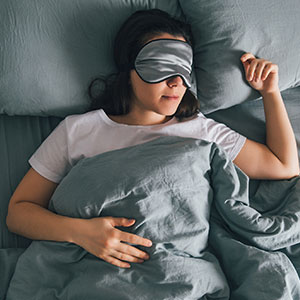 As with diet and exercise, sleep is crucial to our physical, emotional and mental health.
As with diet and exercise, sleep is crucial to our physical, emotional and mental health.
Inadequate sleep can lead to an increase in blood pressure and stress hormone production; the body can become stressed when it does not get enough sleep.
The consequences of poor sleep include reduced concentration, mood swings, irritability, stress, and a weakened immune system. The release of stress hormones can also make it harder to sleep, perpetuating an unhealthy sleep cycle.
Psychological & Physical Factors Affect Sleep
There are many physical and psychological factors that can cause poor sleep; stress is a common cause.
Worries such as elder care, childcare, family conflicts, problems with personal relationships, financial concerns & other anxieties can all interrupt healthy sleep patterns. Physical factors that can affect sleep include pain, excess sweating, need to urinate, noise (including snoring by a bed partner) & light levels.
Gender can also play a role in sleep disturbance. Often times, women are more sleep deprived than men.
Further factors that disrupt sleep include excitement, depression, anxiety, caffeine intake close to bed time, and environmental factors such as room temperature, light levels, humidity, bedding and noise.
Achieving Better Sleep Through Lifestyle Changes & Stress Reduction
In many cases, better sleep can be achieved through changes to our lifestyle and the way we think about things.
Counseling can help address any personal problems which are causing stress; relaxation techniques may be taught to counteract the effects of stress.
There is recent evidence which suggests achieving better quality sleep may be more important that increasing the number of hours sleep.
How Much Sleep Is Needed?
Many experts believe that between 7.5 and 8.5 hours of sleep a night is optimal. However, better sleep does not refer to just the length of time we sleep. Better sleep is quality sleep. 6 hours of deep refreshing sleep is more beneficial than 8 hours of light interrupted sleep.
Tips for Getting Better Sleep:
- Establish a consistent sleep schedule by sleeping at the same time each day of the week (including weekends).
- Relax before sleeping. Prior to sleep, limit any stimulating activities such as exercise and work. Perform activities that you may find relaxing such as reading.
- Create an optimal sleeping environment. Your place of sleep should be dark, ventilated and of an appropriate temperature. Black out blinds can help seal out light in area. If possible, remove any distractions such as computers and TVs from the room. Ensure your bedding is of adequate quality and there is enough space in the bed if you share the bed with a partner (or a pet).
A healthy lifestyle consisting of exercise and a healthy diet can contribute towards better sleep. Avoid alcohol, nicotine and caffeine close to bed time. Whilst alcohol may help some people to relax, it can disrupt sleep throughout the night.
SaveSave
SaveSave
SaveSave

